Congratulations, 2015–2016 Student Advocacy Teams!
A summary of BU Law’s student successes in advanced appellate advocacy, negotiation, and client counseling competitions.
Boston University School of Law student advocacy teams are preparing for another successful year competing against some of the country’s top law students in various appellate advocacy, negotiation, and client counseling competitions. Below, find results from completed competitions, and check back frequently for updates!
Jump to:
- Albers Prize Winners and 2016–2017 Moot Court Boards/ Teams
- Oxford Intellectual Property Moot Court Competition
- Duberstein Bankruptcy Moot Court Competition
- John J. Gibbons Criminal Procedure Moot Court Competition
- Homer Albers Prize Competition – Quarterfinals
- American Bar Association’s National Appellate Advocacy Competition
- Judge John R. Brown Admiralty Moot Court Competition
- Philip C. Jessup International Law Moot Court Competition – US Northeast Regionals
- Texas Young Lawyers Association National Trial Competition – New England Regionals
- Edward C. Stone Moot Court 2015
- National Moot Court – Region 1
Albers Prize Winners and 2016–2017 Moot Court Boards/ Teams
Congratulations to all the student advocacy and moot court teams on a very successful year! And a special congratulations to the 2016 Homer Albers Prize Competition winners, next year’s intermural teams, and the students selected to direct the 2016–2017 competitions.
Homer Albers Prize Winners
Best Brief: Daniel Johnston and Lewis Osterman
Best Oralist: James Orth
Best Team: James Orth and Rama Attreya
Second Team: Joel Antwi and Lauren Breen
2016–2017 Moot Court Boards
Albers Directors: Shea Miller and Laura Sawyer
Esdaile Directors: Elysse Gorney, Joanna LeRoy, and Julie Pearlman
Stone Directors: Rio Gonzalez, Jaclyn Reinhart, and Christopher Walczyszyn
Negotiation & Client Counseling Directors: Andrew Griffin and Wes Howe
2016–2017 Intermural Teams
National Moot Court: Rama Attreya, James Orth, and Lauren Rubin
National Appellate Advocacy: Joel Antwi and Diana Stroud
National Appellate Advocacy: Tavish Brown, Thomas Craig, and Betsy Feldman
Siegenthaler-Sutherland: Daniel Johnston, Lewis Osterman, and Will Simpson
Gibbons Criminal Procedure: Gina Del Rio Gazzo, Veronika Finkelberg, and Brandon Li
Oxford International IP: Stephen Colter, and Sarah Washington
Oxford Intellectual Property Moot Court Competition
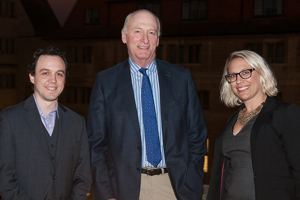
Once again, Boston University School of Law participated in the Oxford Intellectual Property Moot Court Competition held at Oxford University in March 2016. The School was ably represented by Jessica Perry and Benjamin Greene (both ’16) and coached by Professor Robert Volk. The School was one of only twenty-four schools that qualified to participate in the competition, out of forty-nine that submitted briefs. Joining the BU Law team were participants from Canada, Australia, Hong Kong, China, Singapore, Germany, Belgium, Switzerland, India, and the United Kingdom. This year’s issue considered the phenomenon of “ambush marketing” and trademark laws.
In the competition, Perry and Price faced teams from Tsinghua University in Beijing, Oxford University, George Washington University, and the University of Windsor in Windsor, Canada. While the team defeated Tsinghua and Oxford, it lost to George Washington and Windsor in close contests.
Duberstein Bankruptcy Moot Court Competition
On March 5–7, 2016, BU Law School’s Alberto Chavez and Michelle Christodoulou (both ’16) competed in the Twenty-Fourth Annual Duberstein Bankruptcy Moot Court Competition, held at St. John’s University School of Law in New York, New York, and sponsored by the American Bankruptcy Institution. This year, just over fifty teams from more than forty national law schools competed, making it the largest single-site appellate moot court competition.
At the competition, Chavez and Christodoulou were evaluated based on both their written merits brief and their oral presentations to panels of bankruptcy practitioners and judges in three quarter-final rounds. The year’s fact pattern raised jurisdictional and due process in the context of state tort successor liability claims after a free and clear asset sale in bankruptcy. It was a particularly timely topic, as just days after the competition, it was argued before the Second Circuit Court of Appeals in In re Motors Liquidation Company f/k/a General Motors Corp., et al., on appeal from the United States Bankruptcy Court for the Southern District of New York.
Prior to attending the Duberstein competition, Christodoulou and Chavez also competed in the First Annual New England Bankruptcy Moot Court Competition against teams from Suffolk University School of Law and the University of Maine School of Law. That competition was presided over by a panel of jurists from the United States Bankruptcy Court for the District of Massachusetts.
John J. Gibbons Criminal Procedure Moot Court Competition
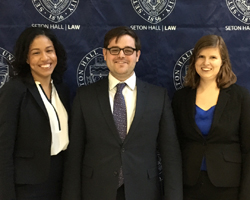
The John J. Gibbons Criminal Procedure Moot Court Competition focuses on timely issues of criminal procedure and criminal law; the problem almost always deals with an issue presently before the Supreme Court. Held at Seton Hall University School of Law, 40 teams from around the country competed this year—including Suzanne Adler, Victoria Doñe, and Zachary Evans (all ’16), who represented BU Law.
Competitors argued two issues: first, whether a state can criminalize a person’s refusal to take a chemical test to identify the presence of alcohol in the blood, such as a breathalyzer, without a warrant; and, second, whether the Sixth Amendment’s Speedy Trial Clause applies to the sentencing phase of a criminal prosecution.
In their first two rounds, the BU Law team faced the Washburn University School of Law, then Texas A&M University School of Law. Scores are not revealed during the competition, but the team received excellent feedback from both benches. In particular, the judges praised Suzanne, who argued both sides of the Sixth Amendment issue, for her thorough knowledge of the law and her ability to directly answer the judges’ questions; they likewise were impressed with both Victoria’s and Zach’s use of the record to draw careful distinctions and respond to the benches’ concerns.
Only sixteen teams could advance to the octofinal round, and unfortunately, our team did not advance this year. Gibbons is one of the most challenging competitions we attend, and we congratulate the students on their efforts!
Homer Albers Prize Competition – Quarterfinals
The Homer Albers Prize Moot Court Competition is an internal, invitational competition open to the top 32 Stone participants. After two preliminary rounds, eight teams of two advance to a quarterfinal elimination round where they argue before panels composed of BU Law faculty. This year’s top 8 will face off before the following faculty:
Monday, March 14
Petitioner: James Orth (’16) and Rama Attreya (’16)
Respondent: Brendan Blake (’16) and Conor Walsh (’16)
Judges: Mark Pettit, Steve Donweber, and Ken Reich
Tuesday, March 15
Petitioner: Lauren Rubin (’16) and Laura Sawyer (’16)
Respondent: Betsy Feldman (’16) and Deborah Hinck (’16)
Judges: Larry Uchill, Elizabeth Jones, and Paul Gugliuzza
Wednesday, March 16
Petitioner: Diana Stroud (’16) and Thomas Craig (’16)
Respondent: Joel Antwi (’16) and Lauren Breen (’16)
Judges: Gerald Leonard, Jay Wexler, and Wendy Gordon
Thursday, March 17
Petitioner: Daniel Johnston (’16) and Lewis Osterman (’16)
Respondent: Adria Bonillas (’16) and Shea Miller (’16)
Judges: Michael Harper, Daniela Caruso, and Linda McClain
The winning teams from each of these arguments will face off in the semifinals on March 29 before New Hampshire Supreme Court Justice Gary E. Hicks, Massachusetts Appeals Court Justice Scott L. Kafker, and Professor Jack Beermann and March 31 before RI Supreme Court Justice Maureen McKenna Goldberg, Massachusetts Appeals Court Justice Andrew R. Grainger, and Professor David Rossman.
The winning teams from semifinals will meet in the finals before Robert N. Davis (United States Court of Appeals for Veterans Claims), William J. Kayatta (United States Court of Appeals for the First Circuit), and David J. Barron (United States Court of Appeals for the First Circuit).
American Bar Association’s National Appellate Advocacy Competition
Anthony Maneiro and Anthony Shaheen (all ’16) represented BU Law at the ABA’s National Appellate Advocacy Competition, Boston Regional on March 3–5 at the Edward W. Brooke Courthouse in Boston. This year’s problem asked students to argue first whether a police officer can have a reasonable expectation of privacy in the contents of his department-issued locker, and second, whether and when a police officer can be guilty of under the federal hate crime statute.
The BU Law team faced off against teams from St. Mary’s School of Law and South Texas College of Law in the first two preliminary rounds of competition. Although the team argued well, receiving high marks from the judges on their confidence and knowledge of the law, the opposing teams scored just a few more points. The BU Law team defeated the University of Akron School of Law in the final preliminary round, but because of an unusually high number of teams with a perfect record, was unable to advance. Jen McCloskey, associate director of the Legal Writing and Appellate Advocacy Program, was especially impressed with the team’s ability to modify and adapt their arguments after each round. The team did a wonderful job representing BU Law.
Judge John R. Brown Admiralty Moot Court Competition
March 3–5
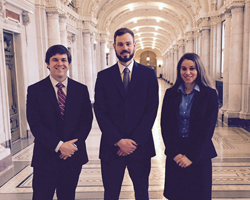
BU Law students Alexandra Putnam, Courtland Roberts, and Jonathan Upchurch (all ’16) won all three rounds in which they argued in the Judge John R. Brown Admiralty Moot Court Competition in the Ninth Circuit courthouse in San Francisco, California. Although they won their oral arguments against Roger Williams School of Law, University of California Hastings School of Law, and Tulane University Law School, their total oral argument and brief scores did not qualify for the quarter final round. This year, 26 teams from 18 law schools competed in this national moot court competition. The drafters of the admiralty problem choose an issue they think the Supreme Court should hear. So far, the Court has granted certiorari in cases involving two of the issues chosen by the competition.
Competitors must draft a brief that complies with Supreme Court rules and argue both sides of the problem. Briefs and oral arguments are graded and judged by practicing admiralty lawyers; the final round is decided by judges familiar with admiralty law. Although this year’s team did not win the competition, they did extremely well in the oral arguments.
Philip C. Jessup International Law Moot Court Competition – US Northeast Regionals
February 4–7
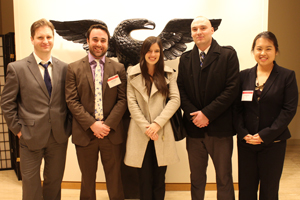
A team of Boston University School of Law students recently competed in the 57th Philip C. Jessup International Law Moot Court Competition, the world’s largest moot court competition. Our team of five, Joshua Duncan (‘17), First Applicant; Jordan Shockett (‘17), Second Applicant; Mateusz Czapla (‘17), First Respondent; Shaelyn Gambino Morrison (‘17), Second Respondent; and Crystal Xinzhu Zhao (‘18) Of Counsel, joined 550 law schools in more than 80 countries in the qualifying rounds of the competition.
To advance to nationals, each team must participate in four preliminary rounds of oral arguments. The competition considered the cumulative points based on oral arguments as well as the scores received on the briefs. BU Law’s team won against teams from the University of Massachusetts School of Law and Albany Law School, but was not successful against teams from New England School of Law, and Cornell Law School.
“Even though oral qualifying rounds were held a week earlier this year, our team practiced intensively right up until the day of competition,” says Visiting Assistant Professor of Law Cosette Creamer, who advised the team in the competition. “They improved dramatically over the course of that week and held their own against some of the top teams in the competition. I think it’s fair to say that it was an incredible learning experience for everyone.”
Texas Young Lawyers Association National Trial Competition – New England Regionals
BU Law team advances to final round in the regional tournament; Brandon Winer (’18) awarded best advocate.
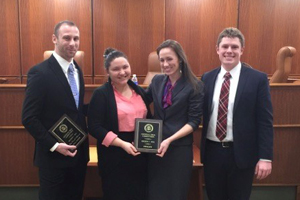
Please join us in congratulating the Boston University School of Law Mock Trial program for their success in the northeast regional Texas Young Lawyer’s Association National Trial Competition!
Students Evan Bailey (’18), Gina del Rio Gazzo (’17),Katherine Depangher (’18), Mathew Hough (’17), Silvia Stockman (’16), Brandon Winer (’18), and Abby Zayyad (’17) represented BU Law in the tournament hosted by the Quinnipiac School of Law, where they competed in several trials among 26 teams from 13 law schools.
This marks the third year the BU Law Mock Trial program, a student-run trial advocacy organization founded in 2012, has attended and placed well in the regional tournament. In the TYLA tournament, teams field two advocates that act as attorneys in prosecuting or defending a criminal case. The attorneys direct and cross-examine witnesses, who are in a common pool. When the witnesses are assigned to a trial, the advocates have to prep the witnesses in what it is called the “woodshed” time, which is just 15 minutes. In this respect, it models the real world in that attorneys often have very little time to prep witnesses.
The tournament featured three preliminary rounds, a semi-final round, and then the finals. Mat Hough, Katherine Depangher, and Brandon Winer advanced to the competition finals, where they faced Yale Law School. The four presiding judges issued a split decision, with two judges in favor of each team. One judge’s scores were dropped at random following a coin toss, and Yale ultimately took home the victory. Please join us in extending a special congratulation to Brandon Winer, who was recognized as Best Advocate.
Edward C. Stone Moot Court 2015
Thirty-two students invited to participate in Albers competition.
BU Law congratulates this year’s participants in the Edward C. Stone Moot Court competition! Nearly one-third of the 2L class participated in this year’s competition, and all of the participants are to be commended for their hard work. In particular, we’d like to recognize the winners of the Best Brief and Best Oralist awards for each problem, as well as the Albers invitees, who are listed below.
Best Brief
- Jaclyn Reinhart & Rio Gonzalez, Elysse Gorney for Problem 1: Grady v. Grady (Family Law)
- Thomas Craig & Diana Stroud for Problem 2: United States v. Gellar-King (4th Amendment/Clean Water Act)
- Michael Lemons & Laura Sawyer for Problem 3: Lyon v. Lynch (Immigration Law/Chevron)
Best Oralist
- Rama Attreya for Problem 1: Grady v. Grady (Family Law)
- Brendan Blake for Problem 2: United States v. Gellar-King (4th Amendment/Clean Water Act)
- Deborah Hinck for Problem 3: Lyon v. Lynch (Immigration Law/Chevron)
Problem 1, Grady v. Grady, considered two child support award issues. Students were asked to argue whether a state court could order a stepparent, who described himself as his stepchildren’s biological father and acted as a father to them during marriage, could be ordered to pay permanent child support under theories of either equitable estoppel, implied or express contract. The second issue was whether incarceration for a voluntary criminal offense could constitute a material and unanticipated change in circumstances to justify a downward modification of a child support order.
Problem 2, United States v. Gellar-King, considered issues of constitutional and environmental law. First, students argued whether the community care-taking exception of the Fourth Amendment, which allows a search when the police find evidence of a crime while acting to protect the public from a potentially dangerous exception, permitted an officer to search a private home without a warrant. Second, the problem considered whether the pollution of groundwater that is hydrologically and functionally equivalent to the pollution of navigable water could qualify as pollution of a “water of the United States” under the text of the Clean Water Act.
Problem 3, Lyon v. Lynch, presented issues of immigration and administrative law, along with a statutory interpretation problem. The first issue was whether § 1226(c) of the Immigration and Nationality Act, which requires mandatory detention of certain classes of deportable aliens who have committed enumerated offenses, is ambiguous as to when those aliens must be taken into custody. Issue 2 concerned whether, if the provision were found to be ambiguous, a federal court would be required under Chevron precedent to defer to a government agency, the Board of Immigration Appeals, for its interpretation of § 1226(c).
The following 32 students, who had the highest combined brief and oral scores, were invited to participate in the Homer Albers Moot Court competition in the spring. Congratulations to the winners, the Albers invitees, and all of the participants in this year’s competition!
| Adria Bonillas Brendan Blake Conor Walsh Deborah Hinck Ethan Kenerson James Orth Laura Sawyer Malavika Lobo Nathalie Rowles Sarah Washington Thomas Craig |
Betsy Feldman Christina Colaizzo Duszlak Daniel Goodwin Diana Stroud Gina Del Rio Gazzo Joel Antwi Lauren Breen Maryanne Tomazic Rama Attreya Shea Miller Will Simpson |
Brandon Li Christopher Walczyszyn Daniel Johnston Elizabeth Hudson Jaclyn Reinhart Kelsea Medard Lauren Rubin Matthew Lawrence Rio Gonzalez Tavish Brown |
Reported by Lacey Brantley (’16)
National Moot Court – Region 1
BU Law team scores well in oral argument in preliminary round.
November 21–22, 2015
Congratulations to Avery Lehr, Angela DiIenno, and John Sadek (all ’16) on their performance at the National Moot Court competition for Region 1. The event, co-sponsored by the American College of Trial Lawyers and the New York City Bar, was held at Suffolk University Law School.
This year’s problem asked students to argue about the definition of personal benefit and the level of knowledge required to find a tippee liable in a Securities & Exchange Commission insider trading action. Students also had to argue about whether exculpatory grand jury testimony from a now-unavailable witness could be admitted at trial.
The team drew two of the toughest preliminary round opponents with some of the highest brief scores: Boston College and Suffolk. In the first round, our team faced Suffolk. Both teams received high, nearly tied, oral argument scores, but Suffolk’s higher brief score gave them the edge and the victory in the round. In round two, the team faced BC; although they argued well, they ultimately lost a close round.
Although the team did not advance, they received positive feedback from the judges on their knowledge of the law, their poise, and their analysis. Jen Taylor McCloskey, associate director of Legal Writing and Appellate Advocacy Programs and the team’s coach, said, “The competition was especially tough this year, compared to past years. The team argued exceptionally well and put their best efforts forward, which the judges recognized.”
We congratulate them on their hard work, dedication, and collegiality throughout the competition!